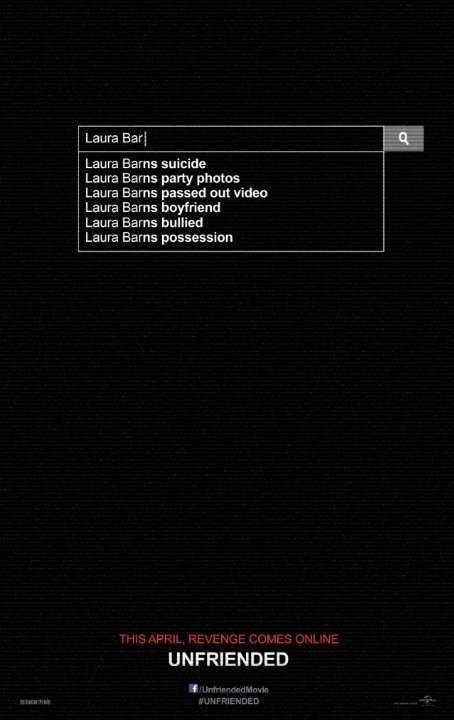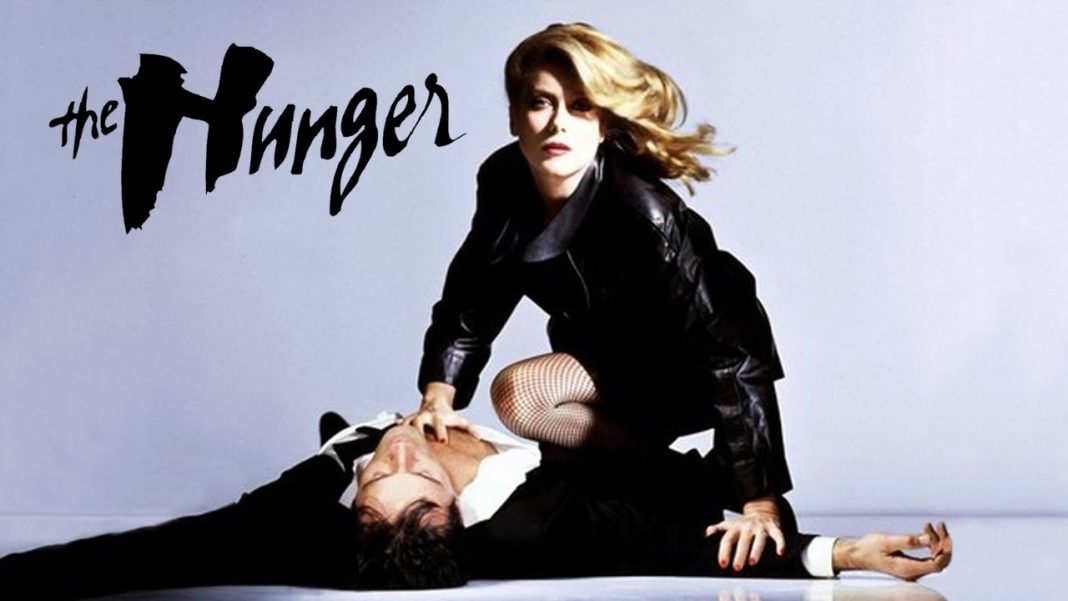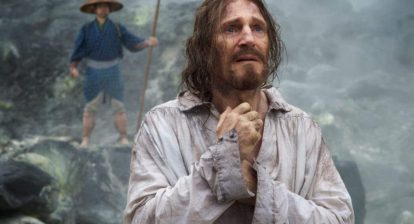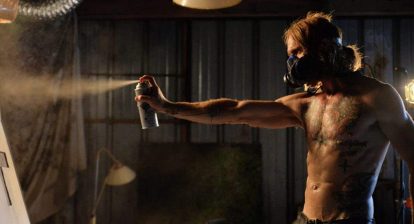Wicked Horror ran a review of Unfriended on opening weekend (original review) and rated the film fairly negatively. But back with a second opinion is Joey Keogh, who will make a case for why she thinks you should give the film a chance.
Despite what you may have read online, Unfriended is not the first horror movie told entirely via computer screen; The Den and Open Windows both utilised this gimmick first and, in the case of the former, better. The Den is, at times, completely terrifying because it roots itself entirely in the real world, with bloodthirsty Internet fiends stalking the final girl, mostly unbeknownst to her. In fact, when introducing the flick at Frightfest 2014, one of the organisers admitted he’d freaked himself out watching it on his laptop the previous night. The same could not be said of Open Windows, an Elijah Wood vehicle that pitches him against a pervy Cockney hacker and puts Sasha Grey in the damsel in distress role: Fun and entertaining, sure, but not scary. However, where The Den revelled in pitting evil humans against its victim, and Open Windows made it all about who could hack what faster, Unfriended opts for the audience-pleasing paranormal activity route. The really shocking thing about the flick being it somehow makes this idea scary again.
Opening with a shocking suicide video, the movie quickly establishes its final girl as Blaire, a seemingly nice enough chick who’s clearly hiding something. Joining her in a Skype conference call are her boyfriend, two of her supposed girl friends (although none of them really seem to get along, natch), a quick-witted nerd and an asshole jock. It’s the typical slasher movie set-up with one, key difference: They can’t run away. They are glued to their computer screens just as we are glued to the big screen, although this sounds headache-inducing on paper, in practice it works astonishingly well–never again will those three dots signalling that someone is typing be anything other than gulp-inducing. Blaire jumps from window to window, meaning we aren’t ever stuck on one visual for too long and, as is the intent of the film, we get to be slightly voyeuristic, too. We watch her hesitate over messages, typing and re-typing as she tries to figure out what to say, beg her boyfriend to respond and check out potentially damaging photos and videos before choosing not to share what she knows.
Of all the unfortunate kids involved, Blaire is the only one who keeps a constant dialogue going with the supposed ghost on Facebook, which helps establish the threat while also hinting that maybe she’s slightly safer than the others. And, as this is an Internet-themed movie, the catalyst for which is some poor girl’s suicide, there is inevitably a discussion about trolling (the nerdy one immediately dead-pans “obvious troll is obvious” when the ghost first starts interacting with them on Skype). The message behind Unfriended is to do unto others as you would have them do unto you because eventually it all comes back to haunt us. Refreshingly, the addition of so-called creepy pasta (i.e. creepy Internet ghost stories) feels organic instead of expository, or as though it’s pandering to the target demographic. Blaire doesn’t linger on the site long enough for us to read it, but hops back and forth so we know what she’s thinking. Often, these kinds of movies feel the need to hammer every point home but Unfriended is confident enough to establish its central conceit and let us fill in the blanks ourselves.
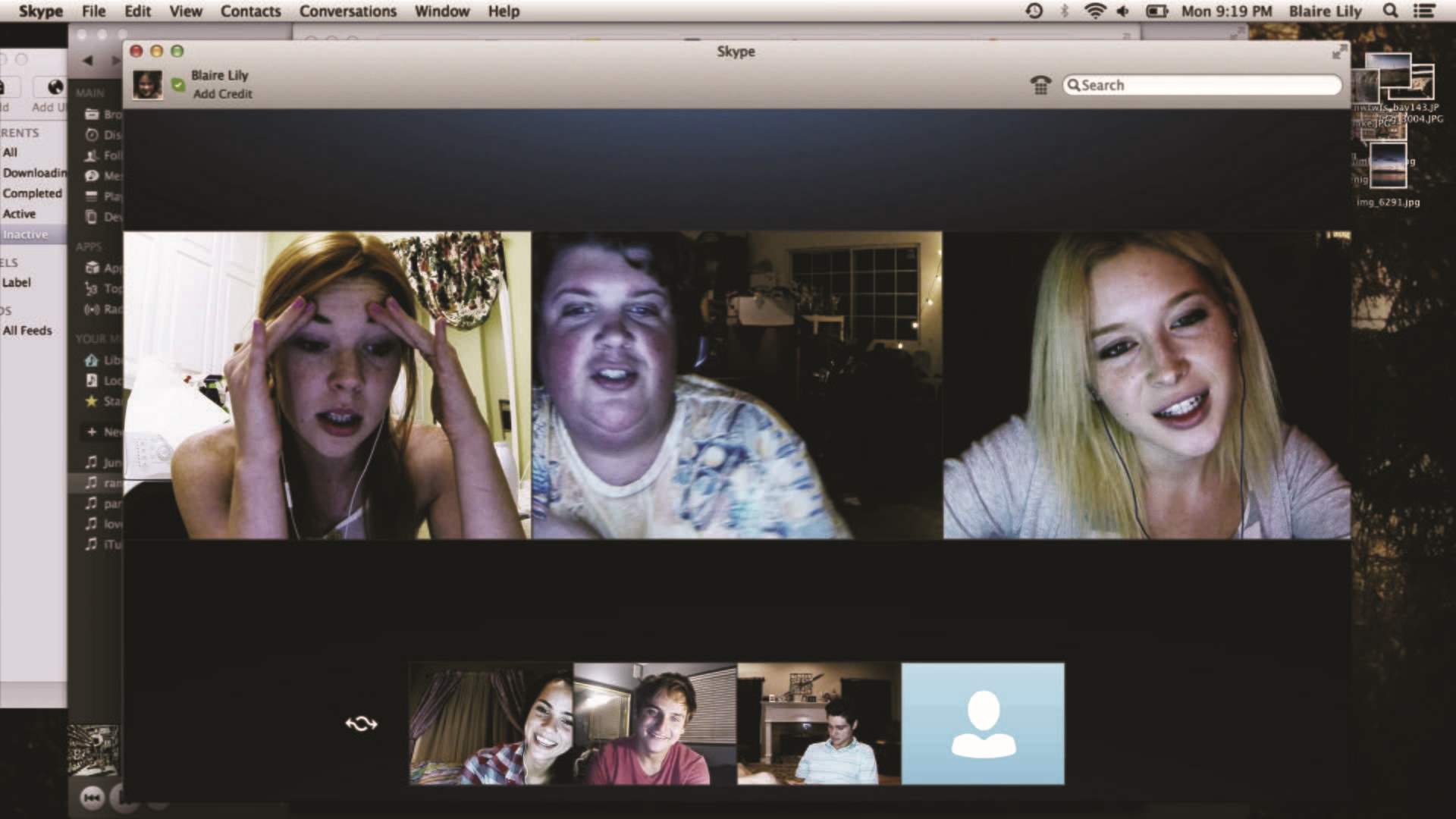 The biggest criticism of horror, in general, never mind films like this, tends to be the obvious suggestion; “why don’t they just run away/hang up/close their computers” etc. But here, that idea is confronted head on and done away with pretty quickly as, whenever someone tries to do something stupid like log off, hang up the call–and, in a couple of particularly tense sequences, call the cops–the sixth, unknown participant calmly types a message assuring them they will be punished for doing so. And they are, in varyingly horrifying ways. This creates a constant back-and-forth where the real villain is never quite clear as the horrible, cocky kids consistently think they’ve figured it all out only to be knocked back by their own stupidity. In a lot of ways, Unfriended is a damning indictment of teens nowadays and their reliance on social media over real-life interaction, and the way in which it ratchets up the tension, knocking the kids off one by one, only drives the point home further. None of them are really safe unless they’re truly sorry.
The biggest criticism of horror, in general, never mind films like this, tends to be the obvious suggestion; “why don’t they just run away/hang up/close their computers” etc. But here, that idea is confronted head on and done away with pretty quickly as, whenever someone tries to do something stupid like log off, hang up the call–and, in a couple of particularly tense sequences, call the cops–the sixth, unknown participant calmly types a message assuring them they will be punished for doing so. And they are, in varyingly horrifying ways. This creates a constant back-and-forth where the real villain is never quite clear as the horrible, cocky kids consistently think they’ve figured it all out only to be knocked back by their own stupidity. In a lot of ways, Unfriended is a damning indictment of teens nowadays and their reliance on social media over real-life interaction, and the way in which it ratchets up the tension, knocking the kids off one by one, only drives the point home further. None of them are really safe unless they’re truly sorry.
The centrepiece of the film is a no-holds-barred game of Never Have I Ever, during which it’s revealed that all of these brats have fucked each other over in some way or another. Although this may be seen as a means to make them bag-of-bones victims to be killed for our amusement (which is the case with many a rousing slasher movie), it actually endears us to them as an audience. They all fall apart and immediately profess their regret. It’s only Blaire who sees herself as truly innocent, and the fun comes in guessing whether or not she’s actually telling the truth. Even though all of these characters are horrible in their own ways, they aren’t quite as despicable as certain critics would have you believe. They’re young, immature and unsure of who they are. They lash out at each other because of their own insecurities and they’ve all joined in on bullying this one kid because it’s easier to join the pack than otherwise. This is evident in Blaire’s interactions with the ghost as she pleads with her to understand they only took part because everyone was doing it, as though that’s an excuse.
Much of the criticism levelled at Unfriended is predicated on the fact that the premise could never actually happen. This is true of horror movies in general, so that’s only the case if you find it utterly impossible to suspend your disbelief (fair enough, Internet ghost sounds silly on paper). Considering the ghost is capable of taking over the victims’ computers, it’s much easier to do so here because they characters are reacting exactly how they should be–confused, angry, and often with cocky disbelief–but it just isn’t doing any good. Further to this, there are at least five minutes at the beginning dedicated to trying to hang up on the person and get rid of them. Later, the nerdy fellow even figures out a method of ridding the Skype call of the ghost for good, and it works. But he, of course, ends up paying the price for it in one of the gnarliest, most horrifying sequences of the entire film (hinted at in the trailer, it must be seen to be believed). They can fight as hard as they want but there is no escape.
Unfriended is a particularly great example of how to utilise a low budget to maximum effect. The one location, as it were, makes it feel incredibly claustrophobic, the deaths are shocking and graphic while the glitchy computer screens allow for the picture to drift in and out so the effect is even more disorientating. These sequences also boast some of the most inventive and effective uses of (presumably) practical SFX in ages, with a particularly stomach-churning curling iron-related death ensuring beach waves will soon be a thing of the past. The idea is that, because the teens aren’t ever really sure what’s going on, we shouldn’t be either. The only music is courtesy of Blaire’s play-list. Otherwise, it’s dead silent with none of the quiet-quiet-bang rubbish that we know all too well. There are jump scares, but the fear comes from keeping the focus tight so that only the actors’ confused, pained expressions are visible. We hold our collective breath along with them, because there’s nothing to signal the scares are coming. Movies like Paranormal Activity (a major inspiration for writer Nelson Greaves) played off this idea, asking us to keep watching until something happened. Here, anything could happen at any time but it won’t ever be what we’re expecting.
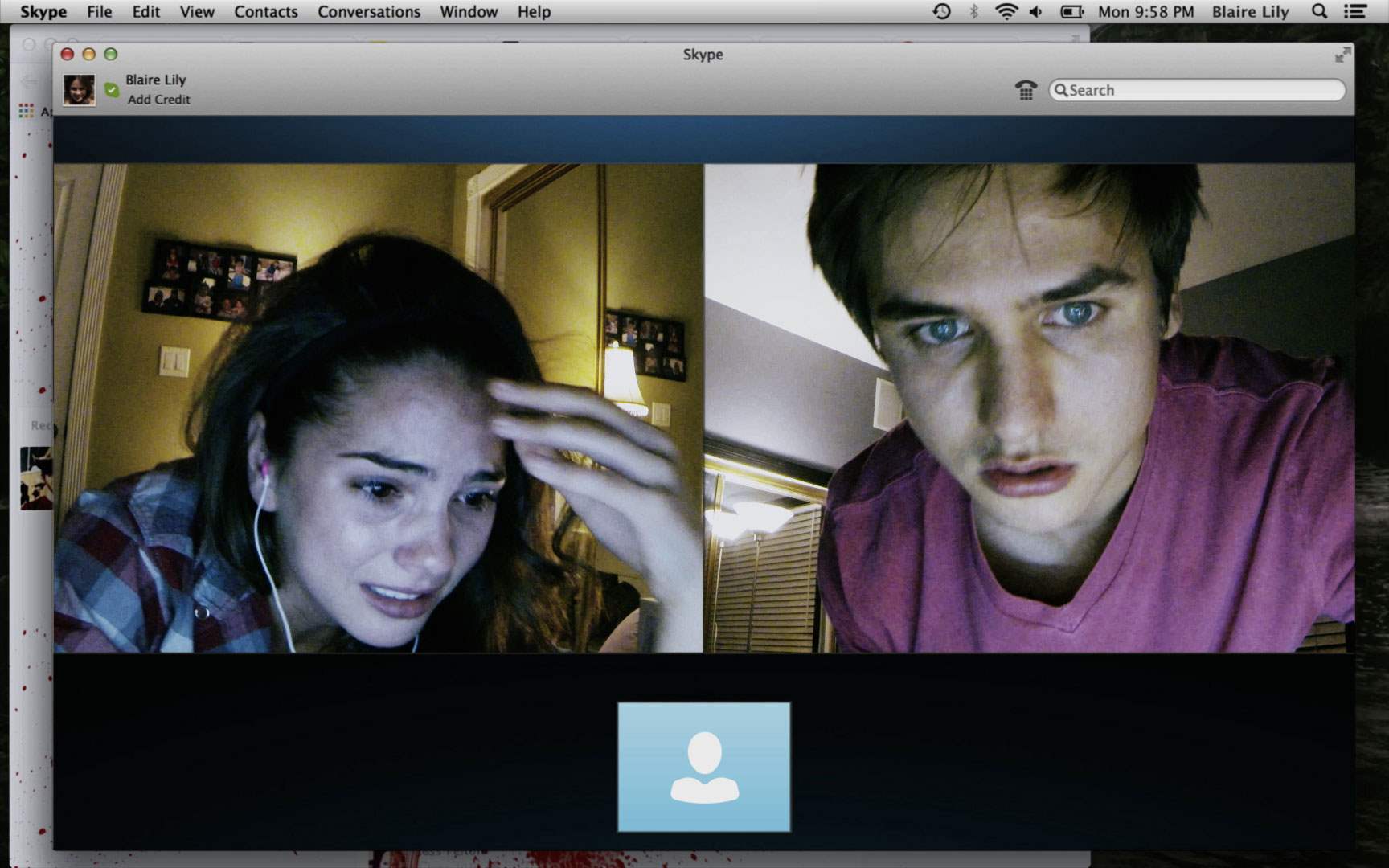 Unlike most other modern horror movies, there are no breaks in the narrative to allow us to relax in between the scares, which is an incredibly brave move considering this is aimed at teens and early twenty-somethings (rated R in the US and 16 in the UK). Having said that, there are still some nice, blackly comic moments, including when Blaire’s boyfriend quips, right at the very beginning, that perhaps the sixth participant in their conversation is a ghost. But, suffice to say, once everything starts going to hell, that’s it, it’s only just a matter of time. The film was supposedly shot as a series of long takes, with all of the actors in the one house, which would make sense given how the story unfolds in real time. The tension doesn’t come from wondering who is next, but rather when and, considering there are no musical cues or sudden noises to speak of, the waiting is often unbearable.
Unlike most other modern horror movies, there are no breaks in the narrative to allow us to relax in between the scares, which is an incredibly brave move considering this is aimed at teens and early twenty-somethings (rated R in the US and 16 in the UK). Having said that, there are still some nice, blackly comic moments, including when Blaire’s boyfriend quips, right at the very beginning, that perhaps the sixth participant in their conversation is a ghost. But, suffice to say, once everything starts going to hell, that’s it, it’s only just a matter of time. The film was supposedly shot as a series of long takes, with all of the actors in the one house, which would make sense given how the story unfolds in real time. The tension doesn’t come from wondering who is next, but rather when and, considering there are no musical cues or sudden noises to speak of, the waiting is often unbearable.
Despite its obvious intentions, the most shocking thing about Unfriended, aside from the fact it’s actually an effective, inventive, very scary horror movie, is the strong anti-bullying message behind it. The two videos of the bullied girl that are shown–the first of her suicide, the second of her drunk and out of it–are rough and quite difficult to watch. The comments telling the victim to kill herself don’t help matters, but it’s the characters’ nonchalant reaction to being told they’re going to pay for what they’ve done that really hits home hard, particularly if you didn’t grow up on-line like the target audience. Renee Olstead features as slutty Jess, which is a fascinating casting choice considering she fell victim to having intimate photos stolen and published on the web not too long ago. Surely this material must have appealed to her just as much as it should with the tech-obsessed teenagers who are already flocking in their droves to see it?
The use of actual social media platforms such as Facebook and Skype ensures that, even during the movie’s more outlandish moments, it’s still rooted firmly in reality. Although it’s unlikely anyone will be too scared to send an iMessage, or Skype a buddy, immediately after seeing it, Unfriended may, at the very least, encourage those who are participating in cyber bullying to take a step back, or to consider that their on-line actions have real-life consequences. The message of the movie seems to be that, when it comes to bullying someone, there is no excuse, regardless of circumstance. Even though it lets itself down slightly by pandering to Paranormal Activity fans in its final moments, this is still one of the most consistently frightening, smart and effective modern horror movies. It’s a shame that Unfriended will probably be talked about most often for its central gimmick, because scratch that surface and there’s a powerful, very topical story being told here, the most frightening element of which is that it’s rooted in real life.
